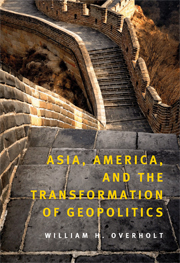Book contents
- Frontmatter
- Contents
- Figures
- Tables
- Preface
- Acknowledgments
- Overview
- CHAPTER ONE Introduction: The Inertia of Foreign Policies
- CHAPTER TWO Cold War Assumptions and Changing Realities
- CHAPTER THREE Regional Trends
- CHAPTER FOUR Asia's Big Powers: Japan and China
- CHAPTER FIVE Smaller Places, Decisive Pivots: Taiwan, Korea, Southeast Asia
- CHAPTER SIX The Aspiring Power and Its Near Abroad: India and South Asia
- CHAPTER SEVEN Russia and Its Near Abroad
- CHAPTER EIGHT The United States and the New Asia
- CHAPTER NINE Scenarios for the Future
- CHAPTER TEN Conclusion
- Bibliography
- Index
CHAPTER SEVEN - Russia and Its Near Abroad
Published online by Cambridge University Press: 05 September 2012
- Frontmatter
- Contents
- Figures
- Tables
- Preface
- Acknowledgments
- Overview
- CHAPTER ONE Introduction: The Inertia of Foreign Policies
- CHAPTER TWO Cold War Assumptions and Changing Realities
- CHAPTER THREE Regional Trends
- CHAPTER FOUR Asia's Big Powers: Japan and China
- CHAPTER FIVE Smaller Places, Decisive Pivots: Taiwan, Korea, Southeast Asia
- CHAPTER SIX The Aspiring Power and Its Near Abroad: India and South Asia
- CHAPTER SEVEN Russia and Its Near Abroad
- CHAPTER EIGHT The United States and the New Asia
- CHAPTER NINE Scenarios for the Future
- CHAPTER TEN Conclusion
- Bibliography
- Index
Summary
Russia: Canada with Testosterone
We've been so desperate to hold together the tatters of our own “near abroad” that we failed to notice that we have now become part of China's “near abroad.”
—Andrei Piontkovsky, Moscow Times, August 15, 2005Putin goes to a restaurant with the leaders of the two houses of parliament. The waiter approaches and asks Putin what he would like to order.
“I'll have the meat.”
“What about the vegetables?”
“They'll have the meat too.”
—Russian jokeThe Soviet Union was weakened by many developments, including important political ones, but it ultimately collapsed because it ran out of money. The costs of giving the military first call on every sector of the economy, of controlling one empire in Eastern Europe and another in Central Asia, of maintaining incompetent allies from Cuba to Angola, of fighting proxy wars in Vietnam and Ethiopia and a direct war in Afghanistan, and of pouring more and more money into more and more inefficient state enterprises at home amounted to one of history's most dramatic cases of imperial overstretch.
The political costs of running out of money and having to retract proved far greater for the Soviet Union than they would have been for an ordinary country, because the Russian empire and the Soviet Union defined themselves, drew their identity from, the majesty of an ever expanding empire. Without this identity, Russia didn't know what it stood for, who its people were, or what its boundaries should be.
- Type
- Chapter
- Information
- Asia, America, and the Transformation of Geopolitics , pp. 205 - 222Publisher: Cambridge University PressPrint publication year: 2007



